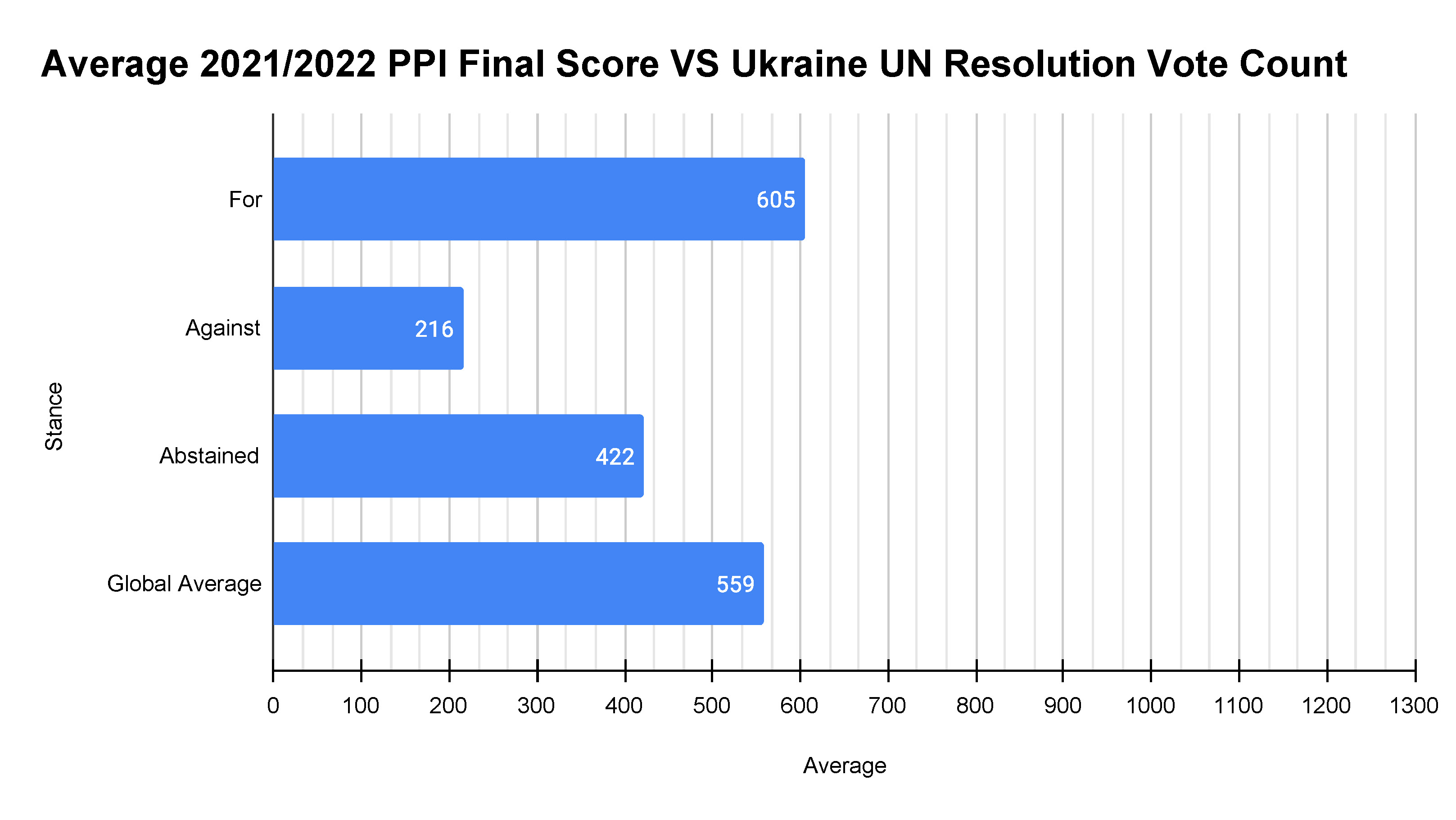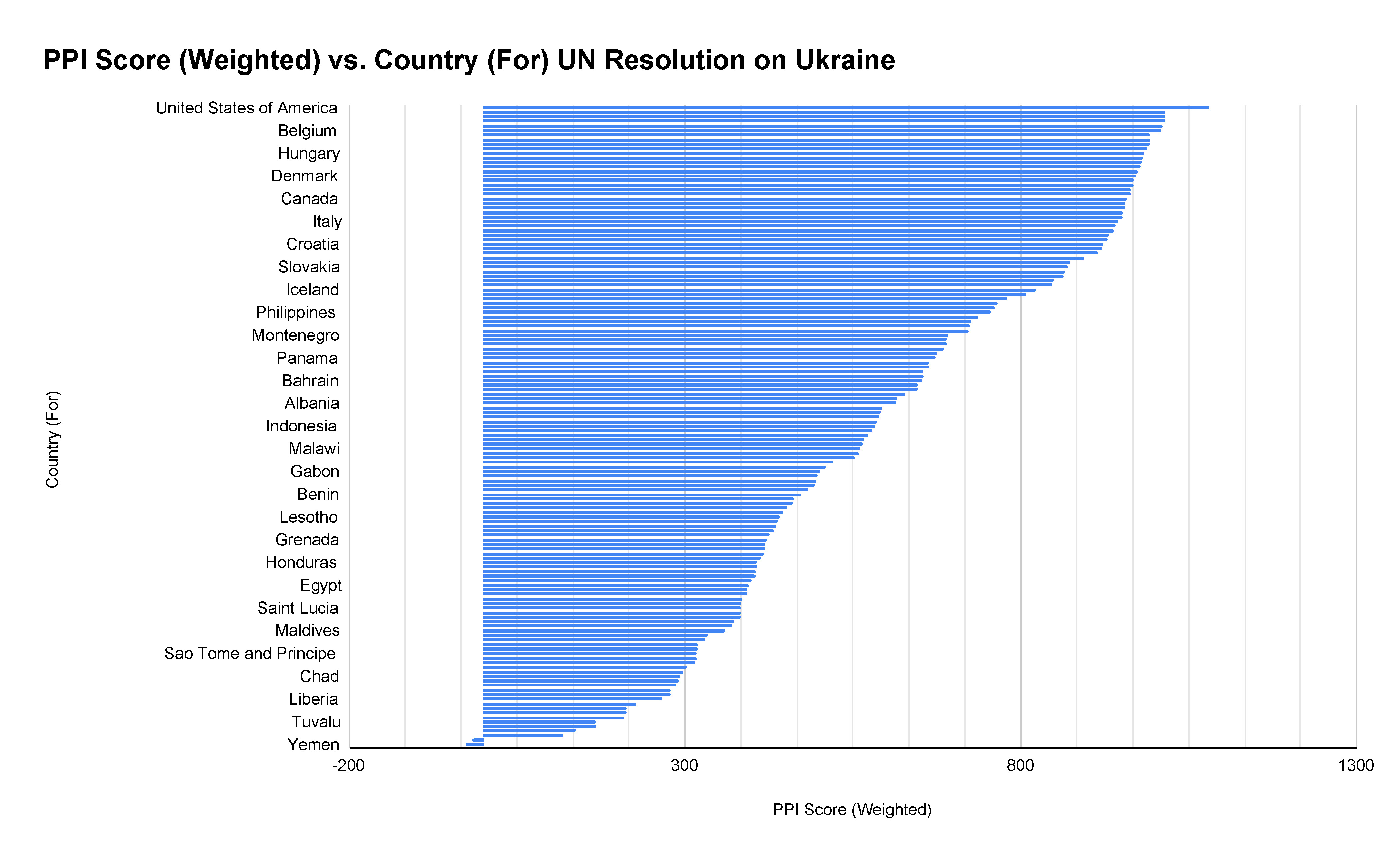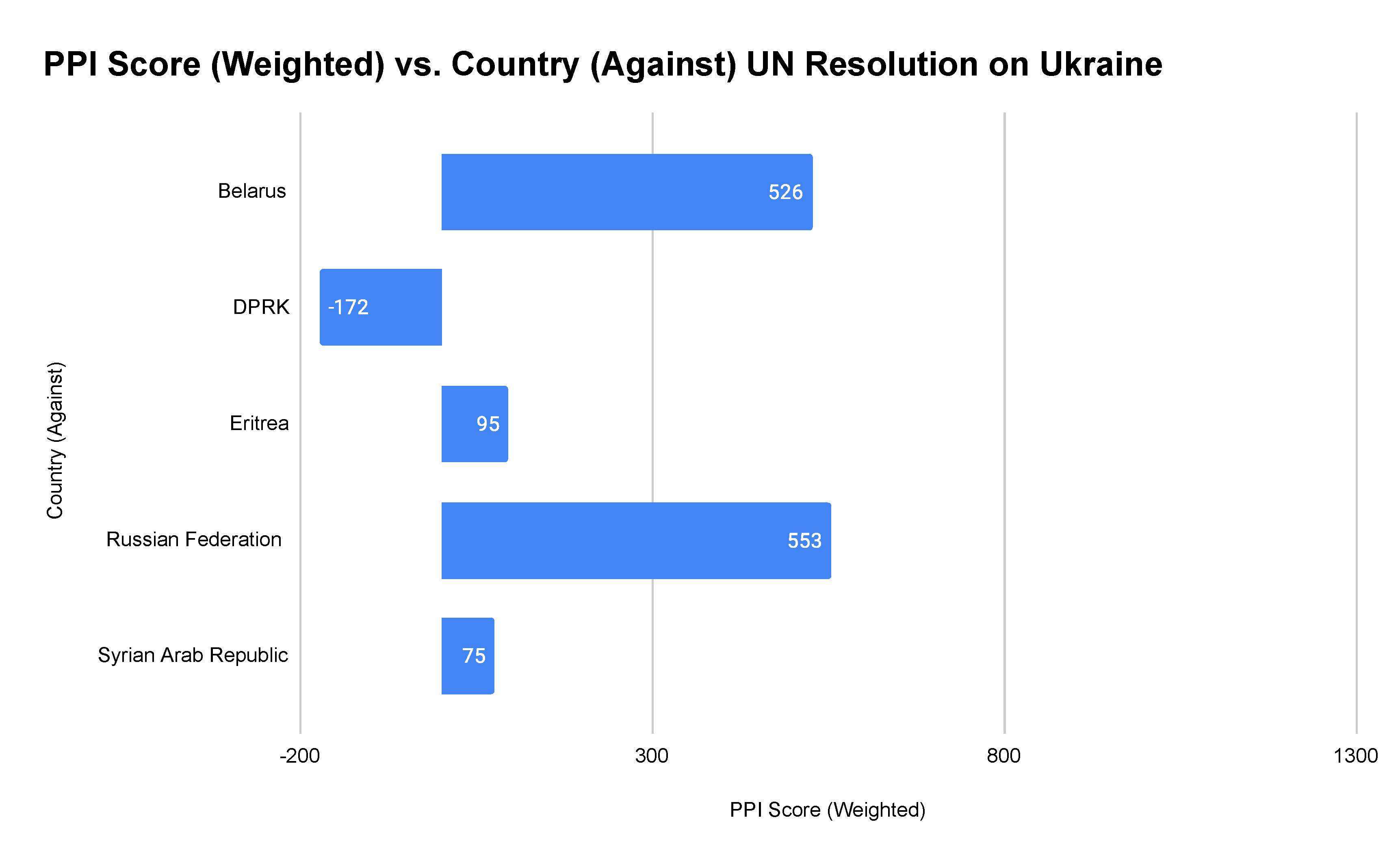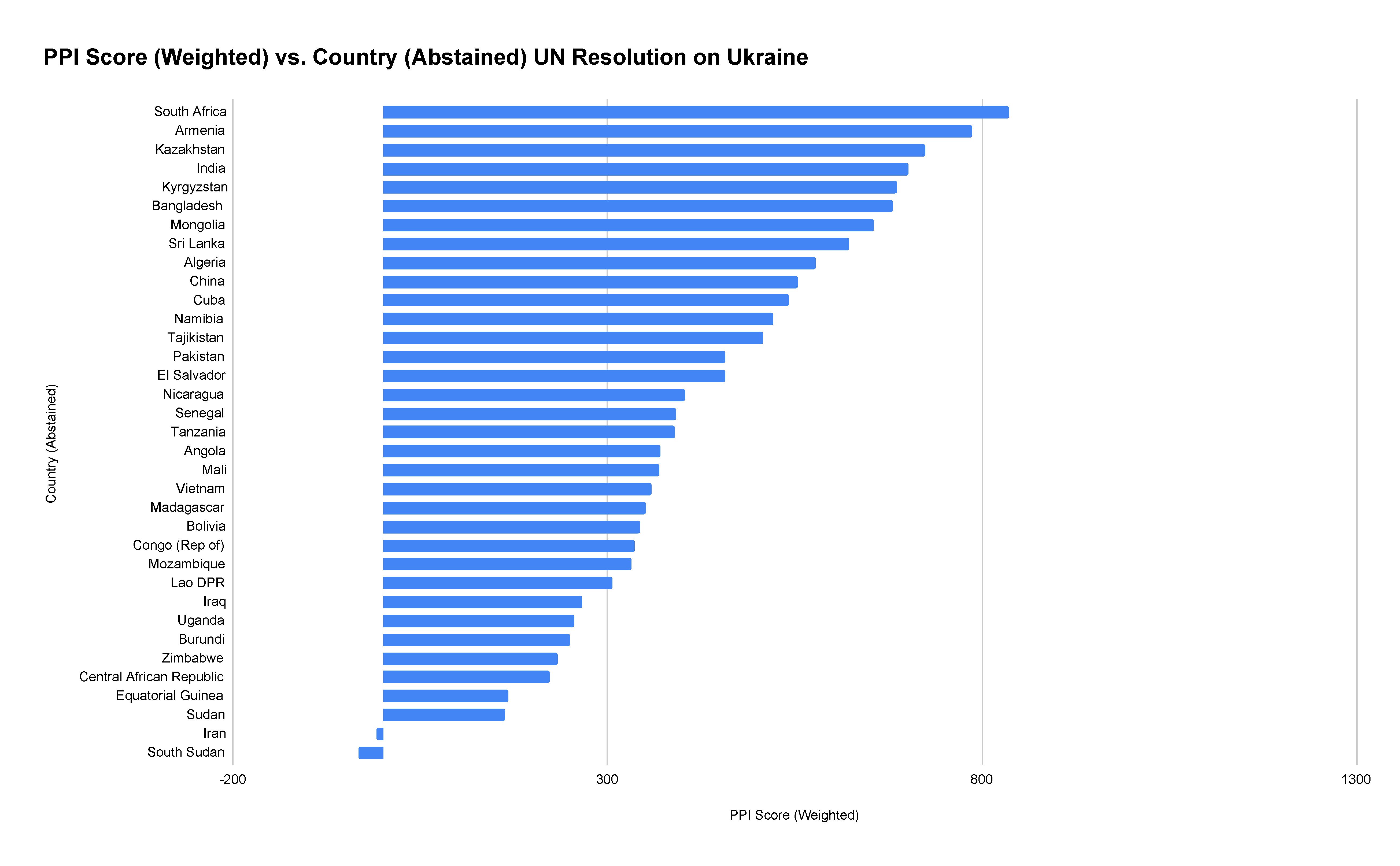Reports
Responsible Statecraft Correlates with UN Vote on Russian Invasion of Ukraine : An Application of the 2021 Peddling Peril Index
by David Albright, Sarah Burkhard, and Spencer Faragasso
March 21, 2022
Introduction
On March 2, 2022, the UN General Assembly convened in New York and voted 141 (in favor), 5 (against), and 35 (abstained), on the UNGA Resolution ES-11/1, condemning and demanding an end to the Russian invasion of Ukraine. This invasion is a paramount shift in the status quo of peaceful relations on the European continent and will have repercussions throughout the world. The Institute decided to assess the vote in terms related to international norms of responsible strategic trade and associated behavior, using the results and findings in the 2021/2022 Peddling Peril Index (PPI), which ranks national strategic trade control systems. We could have selected other international normative comparisons, but we decided to use the PPI since national strategic trade controls are often correlated with more responsible state actions, and the PPI also measures adherence to a large number of international treaties and conventions. A central finding is that the vote is positively correlated with states’ demonstrated commitment and implementation of international arms control, trade control, and financial practices. Countries that voted against the resolution or abstained from voting performed worse, on average, in the Peddling Peril Index.
The Peddling Peril Index
The Peddling Peril Index assesses the commitment and ability of countries worldwide to support nonproliferation and strategic trade control measures. The PPI ranks 200 countries using 105 different sub-criteria (which includes both positive and negative point attributors) across five overarching Super Criteria: International Commitment (100 possible points), Legislation (200 possible points), Ability to Monitor and Detect Strategic Trade (200 possible points), Proliferation Financing (400 possible points), and Adequacy of Enforcement (400 possible points). While most sub-criteria are point-earning criteria, points can also be deducted from countries when negative information is available, such as having high levels of corruption, or being involved in documented evasions of international sanctions on North Korea. A final score out of a maximum 1300 possible points is calculated for each country, and the evaluated countries are ranked by their score. Country performance is also evaluated in sub-groups of countries, such as groups of supply potential. Here, countries are organized into one of three Tiers: Tier 1 countries are those that possess nuclear facilities, nuclear weapons, knowhow, and can supply dual-use items and strategic materials; Tier 2 countries are those that pose a transshipment risk; and Tier 3 countries are all other countries. The tier system is intended to acknowledge the fact that some smaller countries do not have the same resources and needs for strategic trade controls as other, larger, and more economically and technologically developed countries.
The PPI Super Criterion International Commitment measures countries’ membership and adherence to a wide variety of international nonproliferation treaties. Legislation judges the regulatory environment and legal status that exists within a state to support strategic trade control measures. Ability to Monitor and Detect Strategic Trade assesses a state’s capabilities and practices that enable them to control strategic trade. Ability to Prevent Proliferation Financing measures a state’s capability to prevent the financing of WMD proliferation-related activities. Adequacy of Enforcement measures how well a country employs enforcement activities against strategic commodity trafficking and sanctions evasion.
In general, countries that achieve higher scores in the PPI show a greater ability, commitment, and willingness to support and implement strategic trade controls, nonproliferation measures, and related international norms and treaties.
Correlation of Countries’ Voting Decision with PPI Average Scores
When comparing the results of the PPI to the vote count, it is immediately clear that those countries that supported the resolution, on average, perform better across all five super criteria than the global average, and significantly better than those countries that voted against, or even abstained from voting on the resolution (see Figure 1). Those countries in favor of the resolution made up in large part the top scoring countries in the PPI, which includes the United States, United Kingdom, Sweden, Australia, and Ireland. All the countries in the North Atlantic Treaty Organization (NATO) and the members of the European Union voted for the resolution, and coincidentally, those countries are all in the top quarter of the PPI ranking.
The group of countries that voted against the resolution had average scores below the global average across all super criteria. The average score for this group was below 50 percent of total possible points for all five super criteria. In Adequacy of Enforcement, this group received a negative average score.
The countries that abstained from voting on the resolution performed better in the PPI than those that voted against, but moderately worse than those that voted for the resolution. In some areas, like Super Criterion Ability to Monitor and Detect Strategic Trade, this group performed on par with the countries that voted for the resolution, however, in others, like Ability to Prevent Proliferation Financing, they scored nearly as low as those that voted against.
These findings demonstrate that, on average, the countries that supported the resolution demonstrate greater commitments to international nonproliferation norms, have stronger domestic legal trade control environments, and have better enforcement practices and enforcement efficacy than countries that voted against or abstained from voting.

Figure 1. The average final PPI score of all countries, broken down by their voting decision on demanding an end to the Russian invasion of Ukraine.
In order of highest to lowest PPI score, these are the countries that supported the resolution:
United States of America, United Kingdom of Great Britain and Northern Ireland, Sweden, Australia, Ireland, Belgium, Latvia, Estonia, Czech Republic, Republic of Korea, Hungary, Germany, Portugal, Spain, Austria, Denmark, Slovenia, Norway, Singapore, France, Canada, Finland, Netherlands, Switzerland, Lithuania, Italy, Malta, Romania, New Zealand, Japan, Croatia, Cyprus, Bulgaria, Luxembourg, Israel, Slovakia, Greece, Poland, Malaysia, United Arab Emirates, Iceland, Moldova (Rep of the), Mexico, Serbia, Thailand, Philippines, Andorra, Georgia, Macedonia, San Marino, Montenegro, Peru, Brazil, Ghana, Chile, Panama, Mauritius, Turkey, Argentina, Liechtenstein, Bahrain, Costa Rica, Jordan, Uruguay, Ukraine, Albania, Saudi Arabia, Fiji, Botswana, Guatemala, Indonesia, Dominican Republic, Jamaica, Monaco, Trinidad and Tobago, Malawi, Bahamas, Bosnia and Herzegovina, Tunisia, Brunei Darussalam, Gabon, Antigua and Barbuda, Seychelles, Zambia, Qatar, Benin, Kenya, Samoa, Nigeria, Vanuatu, Lesotho, Timor-Leste, Cape Verde, Saint Kitts and Nevis, Paraguay, Grenada, Niger, Bhutan, Nauru, Cote d’Ivoire, Honduras, Kuwait, Solomon Islands, Sierra Leone, Saint Vincent and the Grenadines, Egypt, Suriname, Colombia, Papua New Guinea, Nepal, Saint Lucia, Tonga, Barbados, Ecuador, Dominica, Maldives, Marshall Islands, Belize, Cambodia, Djibouti, Sao Tome and Principe, Oman, Guyana, Comoros, Rwanda, Chad, Gambia, Kiribati, Mauritania, Palau, Liberia, Micronesia (Federated States of), Congo (Dem Rep of the), Lebanon, Myanmar, Tuvalu, Haiti, Afghanistan, Libya, Somalia, Yemen
Digging into the Scores
A total of 141 countries voted for the resolution (see Figure 2). This list includes all the economically advanced democratic nations in the Western Hemisphere. The average total PPI score of a country that voted for the UN Resolution is 605 total points, or just less than half of the total possible points. This group includes the top scoring countries in the PPI (United States, United Kingdom, Sweden, Australia, and Ireland) and nearly all the Tier 1 countries, excluding: India, Pakistan, Russia, China, North Korea, Belarus, Iran, Kazakhstan, and South Africa.
This group of countries had the highest average score across all super criteria. Broken down by super criteria the average scores are as follows: in International Commitment this group scored 58 points (out of 100); in Legislation this group scored 131 points (out of 200); in Monitor and Detect Strategic Trade this group scored 108 points (out of 200); in Proliferation Financing this group scored 118 points (out of 400); in Adequacy of Enforcement this group scored 191 points (out of 400).
More than half of the countries that voted for the resolution received more than 50 percent of the total possible points in Super Criterion International Commitment. This shows that the countries in this group engage in international treaties and agreements, and abide by those agreements, to a greater extent than the countries in the other two groups, as discussed below.
Importantly, this analysis shows that these countries also take enforcement more seriously than their counterparts. This group, on average, scored 183 points higher than the group that abstained. Countries with a higher score in Super Criterion Adequacy of Enforcement are perceived to take enforcement practices more seriously and are less likely to be affected by widespread corruption. Preventing sanctioned entities in Russia from accessing foreign goods and services will largely depend on the enforcement activities of individual states. Countries with relaxed or no enforcement activities will struggle to effectively comply with sanctions.
Not all countries that voted for the resolution performed well in the PPI. Some countries like Afghanistan, Libya, Somalia, and Yemen, rank in the bottom ten countries, and Yemen and Somalia both have negative scores.

Figure 2. The final overall weighted PPI scores for all countries that voted for the UN resolution. (Due to the large number of countries in this group, not all country names are listed on the vertical axis.)
Countries that Voted Against the Resolution (In order of highest to lowest PPI score)
Russian Federation, Belarus, Eritrea, Syrian Arab Republic, DPRK (North Korea)
Five countries voted against the resolution (see Figure 3). These countries perform poorly in nearly all super criteria, especially in their commitments to international treaties, prevent proliferation financing, monitor strategic trade, and enforce strategic trade control measures. The average score of a country that voted against the resolution is 216 total points, less than a quarter of the total possible points. Comparatively, this group performed the worst in Super Criterion Adequacy of Enforcement, where it received a negative score, which reflects the poor enforcement environment that exists in these countries. All these countries, except perhaps Belarus, conduct illicit strategic trade as national policy and practice.
Eritrea, Syria, and North Korea placed in the bottom ten countries of the overall ranking, with North Korea having the worst score of any country and receiving a negative final score of -172.
Broken down by super criteria the average scores are as follows: in International Commitment this group scored 40 points1; in Legislation this group scored 97 points; in Ability to Monitor and Detect Strategic Trade this group scored 77 points; in Ability to Prevent Proliferation Financing this group scored 45 points; and in Adequacy of Enforcement this group received a negative score of -43 points.
In the Adequacy of Enforcement, Belarus, Russia, North Korea, and Syria received negative scores. This negative score reflects the overall lack of willingness and commitment in those countries to enforce international and domestic laws to support strategic trade controls. Russia, Belarus, and Syria all have documented cases of evading sanctions on North Korea and providing dual-use materials and other support to the regime in Pyongyang. Eritrea also had point deductions for evasion of sanctions on North Korea and repeated military collaboration with North Korea.
It seems obvious that the countries that voted against the resolution perform poorly in the PPI when considering that North Korea and Syria are, in fact, two of the worst offenders in terms of human rights abuses, support of terrorist groups, proliferation of weapons of mass destruction and conventional arms, and a general disregard for international treaties and laws. All five countries suffered point deductions in the Peddling Peril Index due to high levels of corruption, evidence of sanctions evasion, support for terrorist entities, and military cooperation with embargoed countries. Further to that point, all five countries appear on the Commerce Department Bureau of Industry and Security (BIS) Country Group D list, which includes countries designated for export controls for national security purposes. All five countries are subject to arms embargoes under BIS Country Group D5, and Russia, North Korea, and Belarus face restrictions under BIS Country Group D2: Nuclear.
Russia is a member of the Nuclear Suppliers Group and is a Tier 1 country. North Korea is also treated as a Tier 1 country because it is a nuclear weapons power, possessing the ability, knowhow, and resources to produce and distribute nuclear weapons, nuclear related materials, and dual-use items. Russia has the largest nuclear arsenal in the world, while North Korea is suspected of having a few dozen weapons. As Tier 1 countries that possess nuclear weapons, Russia’s and North Korea’s rejection of international norms is highly concerning. International treaties only function when they are strictly followed by all parties involved.

Figure 3. The final overall weighted PPI scores for all countries that voted against the UN resolution.
Vote Abstained (In order of highest to lowest PPI score)
South Africa, Armenia, Kazakhstan, India, Kyrgyzstan, Bangladesh, Mongolia, Sri Lanka, Algeria, China, Cuba, Namibia, Tajikistan, Pakistan, El Salvador, Nicaragua, Senegal, Tanzania, Angola, Mali, Viet Nam, Madagascar, Bolivia, Congo (Rep of), Mozambique, Lao DPR, Iraq, Uganda, Burundi, Zimbabwe, Central African Republic, Equatorial Guinea, Sudan, Iran, South Sudan
A total of 35 countries abstained from voting on the resolution (see Figure 4). The average score of a country that abstained from voting is 422 total points. Broken down by super criterion the average scores are as follows: in International Commitment this group scored 50 points; in Legislation this group scored 110 points; in Ability to Monitor and Detect Strategic Trade this group scored 97 points; in Ability to Prevent Proliferation Financing this group scored 49 points; in Adequacy of Enforcement this group received a score of 117 points.
Overall, this group performed better than the group of countries that voted against the resolution, but worse than those that voted for it. In only one Super Criterion, Legislation, did this group’s average score exceed more than 50 percent of the total possible points. Ability to Prevent Proliferation Financing is where this group performed the worst, and barely earned more than 12 percent of the possible points, nearly as bad as the Against group (11 percent).
The total average score received in Super Criteria International Commitment and Ability to Monitor and Detect Strategic Trade is slightly less, but comparable to the average scores received by the countries that voted for the resolution. This suggests that these countries, while evidently not as committed to international cooperation and enforcement practices as the For group, still demonstrate a heightened level of concern as compared to the Against group. Further, this finding is reflected in the fact that they chose to abstain from voting, instead of voting against the resolution.
While it is obvious that Russia would vote against the resolution, it is profoundly concerning that six Tier 1 nations (China, India, Iran, Kazakhstan, Pakistan, and South Africa), including three nuclear weapons states, would abstain from supporting the resolution.

Figure 4. The final overall weighted PPI scores for all countries that abstained from voting on the UN resolution.
Conclusion
This analysis demonstrates that countries that voted against the resolution or abstained from voting performed worse in the Peddling Peril Index, on average. The voting decision reflects the lax stance many of those countries take to international commitments and enforcement of international treaties. Those countries make up the vast majority of states that sponsor terrorism, harbor high levels of corruption, have evidence of international sanctions evasion, and extensive records of human rights abuses.
At the same time, the countries that supported the resolution received higher scores, on average, in all the main areas covered by the PPI, as compared to those that voted against or abstained. The higher scores reflect the greater commitment to enforcing strategic trade controls, international treaties, and abiding by international and national sanctions.
1. Russia’s Super Criterion International Commitment score of 77 is significantly higher than the average and of the other four countries’ scores. ↩

 twitter
twitter